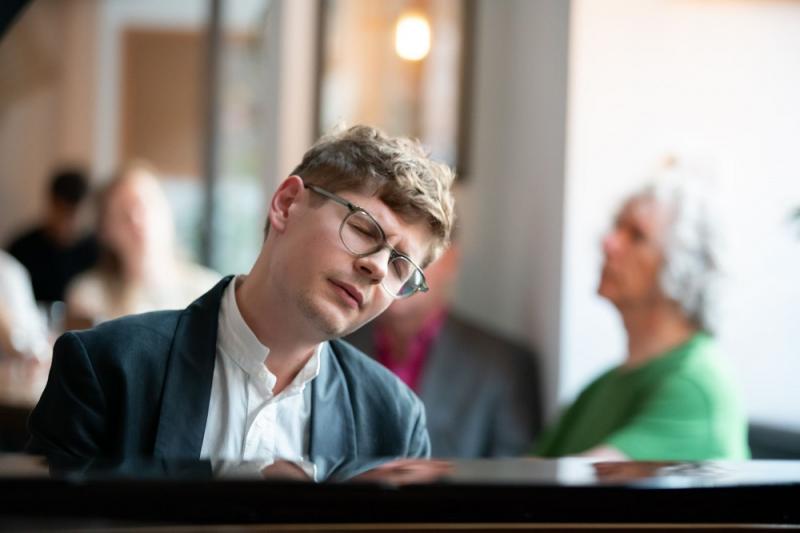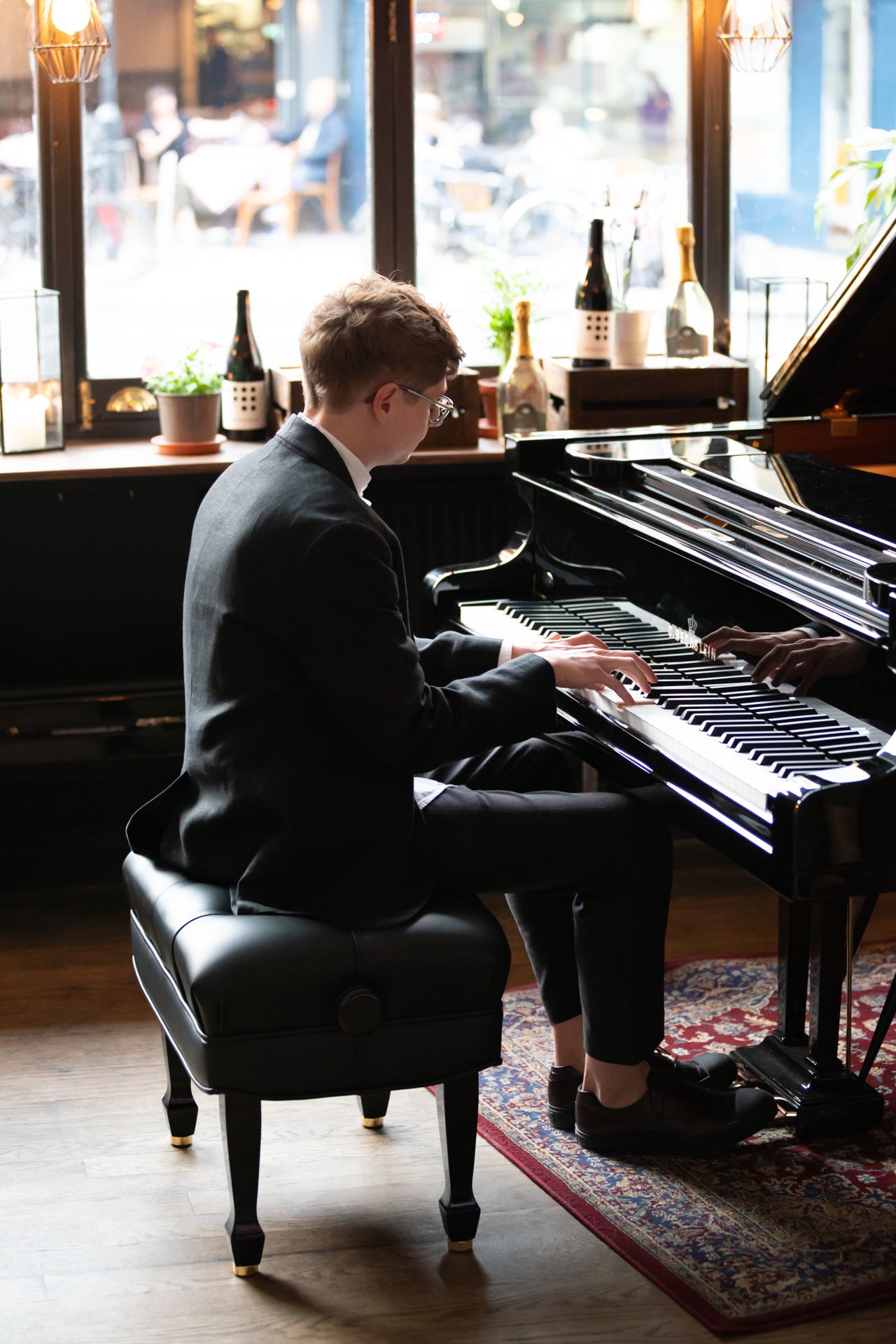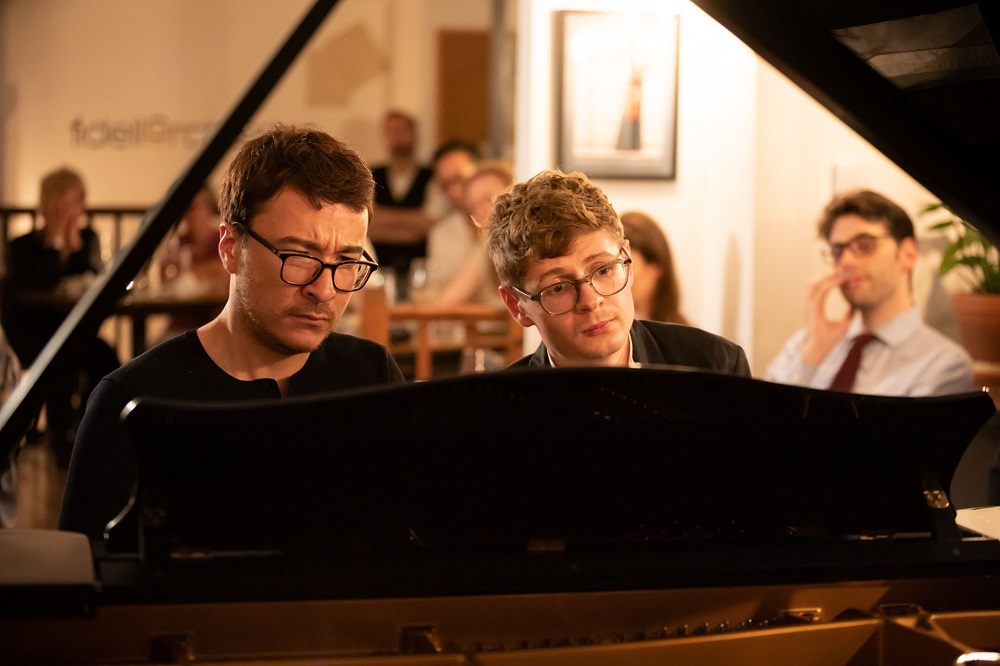Pavel Kolesnikov, Fidelio Orchestra Café review – a Chopin cosmos | reviews, news & interviews
Pavel Kolesnikov, Fidelio Orchestra Café review – a Chopin cosmos
Pavel Kolesnikov, Fidelio Orchestra Café review – a Chopin cosmos
The finest one-act musical drama at close quarters

There is genius not only in the rainbow hues of Pavel Kolesnikov’s playing but also in the way his chosen programmes resonate. He’s given us interconnected wonders from across the centuries, but chose to focus on the greatest of composers for the piano in only his third such recital.
In impeccable English – London has long been his home – Kolesnikov celebrated his return to public performance by underlining how Chopin disliked recitals before large audiences and discovered more about what he'd composed when he played in the salon. But Chopin's is never “salon music” in the disparaging sense; given the right sequence, it creates a universe which resounds from the depths of despair to the music of the spheres.
W e’ve had recitals of huge scope in the Fidelio Orchestra Café already: Steven Isserlis’s Bach, searing sonatas by Beethoven and Janáček from Alina Ibragimova and Samson Tsoy. The statement of intent was clear here in the launch of a C sharp minor trilogy – Polonaise Op. 26 No. 1, Nocturne Op. posth., Fantaisie-Impromptu. Kolesnikov told us he’d agonized over where to put the exquisite E flat major Valse, another “Op. posth.”, discovered only in 1955, until on the way to the venue he realized he should place it as a preface. An immediate encore would not have been appropriate after the clear thunder of the C minor Etude, Op. 25 No. 12, shaking the venue's foundations.
e’ve had recitals of huge scope in the Fidelio Orchestra Café already: Steven Isserlis’s Bach, searing sonatas by Beethoven and Janáček from Alina Ibragimova and Samson Tsoy. The statement of intent was clear here in the launch of a C sharp minor trilogy – Polonaise Op. 26 No. 1, Nocturne Op. posth., Fantaisie-Impromptu. Kolesnikov told us he’d agonized over where to put the exquisite E flat major Valse, another “Op. posth.”, discovered only in 1955, until on the way to the venue he realized he should place it as a preface. An immediate encore would not have been appropriate after the clear thunder of the C minor Etude, Op. 25 No. 12, shaking the venue's foundations.
With Kolesnikov, no repeated phrase ever sounds like its first appearance; what happens in the middle of a piece changes any return of the main subject-matter. Profoundly, for the first time, in the A flat major Impromptu, and even more so – albeit as a given – when the repeated A flats form a bridge to the tragic juggernaut which sweeps over the fragile consolation of the D flat major Prelude, but doesn’t destroy it. This was the core for a pianist who understands Chopin’s interweaving of heaven and hell. The demonic leapt out unexpectedly sometimes, in the giddy revolutions of the C sharp minor Valse; nothing merely pretty or ethereal here, more a Mephisto Waltz. Fantasy and wit came later, in several Mazurkas, while restlessness coming to a poetic halt struck with exceptional vividness in the A flat Impromptu and G sharp minor Etude, Op. 10 No. 5, with its sudden ray of light at the end.  Encores, when they came much later, before and after dessert (citrus olive oil cake with saffron mascarpone cream, as original a mix of flavours as anything in Alan Rosenthal’s consistently fine menus), turned out to be unusually rich. The second movement of a G minor Sonata by C P E Bach provided another meditative turn inwards; it always amazes me how the great artists in this series pull focus from the variable traffic and human life humming outside the cafe windows on the Farringdon Road. And there was a return to the Wigmore Hall programme Kolesnikov shared with partner Tsoy back in June (the two pictured above at the Fidelio Orchestra Cafe), in the poignant depths of the Schubert F minor Fantasie, but this time with an audience. So colossal is Schubert’s contrapuntal expansion of horizons towards the end that you wonder if another fragile melody is ever to return. It did, and how poignantly, another impression to fortify us through the difficult months.
Encores, when they came much later, before and after dessert (citrus olive oil cake with saffron mascarpone cream, as original a mix of flavours as anything in Alan Rosenthal’s consistently fine menus), turned out to be unusually rich. The second movement of a G minor Sonata by C P E Bach provided another meditative turn inwards; it always amazes me how the great artists in this series pull focus from the variable traffic and human life humming outside the cafe windows on the Farringdon Road. And there was a return to the Wigmore Hall programme Kolesnikov shared with partner Tsoy back in June (the two pictured above at the Fidelio Orchestra Cafe), in the poignant depths of the Schubert F minor Fantasie, but this time with an audience. So colossal is Schubert’s contrapuntal expansion of horizons towards the end that you wonder if another fragile melody is ever to return. It did, and how poignantly, another impression to fortify us through the difficult months.
- This week's performer at the Fidelio Orchestra Cafe from tomorrow is the pianist Louis Schwizgebel. Further details on the website
- More classical music reviews on theartsdesk
rating
Explore topics
Share this article
The future of Arts Journalism
You can stop theartsdesk.com closing!
We urgently need financing to survive. Our fundraising drive has thus far raised £49,000 but we need to reach £100,000 or we will be forced to close. Please contribute here: https://gofund.me/c3f6033d
And if you can forward this information to anyone who might assist, we’d be grateful.

Subscribe to theartsdesk.com
Thank you for continuing to read our work on theartsdesk.com. For unlimited access to every article in its entirety, including our archive of more than 15,000 pieces, we're asking for £5 per month or £40 per year. We feel it's a very good deal, and hope you do too.
To take a subscription now simply click here.
And if you're looking for that extra gift for a friend or family member, why not treat them to a theartsdesk.com gift subscription?
more Classical music
 Appl, Levickis, Wigmore Hall review - fun to the fore in cabaret and show songs
A relaxed evening of light-hearted fare, with the accordion offering unusual colours
Appl, Levickis, Wigmore Hall review - fun to the fore in cabaret and show songs
A relaxed evening of light-hearted fare, with the accordion offering unusual colours
 Lammermuir Festival 2025, Part 2 review - from the soaringly sublime to the zoologically ridiculous
Bigger than ever, and the quality remains astonishingly high
Lammermuir Festival 2025, Part 2 review - from the soaringly sublime to the zoologically ridiculous
Bigger than ever, and the quality remains astonishingly high
 BBC Proms: Ehnes, Sinfonia of London, Wilson review - aspects of love
Sensuous Ravel, and bittersweet Bernstein, on an amorous evening
BBC Proms: Ehnes, Sinfonia of London, Wilson review - aspects of love
Sensuous Ravel, and bittersweet Bernstein, on an amorous evening
 Presteigne Festival 2025 review - new music is centre stage in the Welsh Marches
Music by 30 living composers, with Eleanor Alberga topping the bill
Presteigne Festival 2025 review - new music is centre stage in the Welsh Marches
Music by 30 living composers, with Eleanor Alberga topping the bill
 Lammermuir Festival 2025 review - music with soul from the heart of East Lothian
Baroque splendour, and chamber-ensemble drama, amid history-haunted lands
Lammermuir Festival 2025 review - music with soul from the heart of East Lothian
Baroque splendour, and chamber-ensemble drama, amid history-haunted lands
 BBC Proms: Steinbacher, RPO, Petrenko / Sternath, BBCSO, Oramo review - double-bill mixed bag
Young pianist shines in Grieg but Bliss’s portentous cantata disappoints
BBC Proms: Steinbacher, RPO, Petrenko / Sternath, BBCSO, Oramo review - double-bill mixed bag
Young pianist shines in Grieg but Bliss’s portentous cantata disappoints
 theartsdesk at the Lahti Sibelius Festival - early epics by the Finnish master in context
Finnish heroes meet their Austro-German counterparts in breathtaking interpretations
theartsdesk at the Lahti Sibelius Festival - early epics by the Finnish master in context
Finnish heroes meet their Austro-German counterparts in breathtaking interpretations
 Classical CDs: Sleigh rides, pancakes and cigars
Two big boxes, plus new music for brass and a pair of clarinet concertos
Classical CDs: Sleigh rides, pancakes and cigars
Two big boxes, plus new music for brass and a pair of clarinet concertos
 Waley-Cohen, Manchester Camerata, Pether, Whitworth Art Gallery, Manchester review - premiere of no ordinary violin concerto
Images of maternal care inspired by Hepworth and played in a gallery setting
Waley-Cohen, Manchester Camerata, Pether, Whitworth Art Gallery, Manchester review - premiere of no ordinary violin concerto
Images of maternal care inspired by Hepworth and played in a gallery setting
 BBC Proms: Barruk, Norwegian Chamber Orchestra, Kuusisto review - vague incantations, precise laments
First-half mix of Sámi songs and string things falters, but Shostakovich scours the soul
BBC Proms: Barruk, Norwegian Chamber Orchestra, Kuusisto review - vague incantations, precise laments
First-half mix of Sámi songs and string things falters, but Shostakovich scours the soul
 BBC Proms: Alexander’s Feast, Irish Baroque Orchestra, Whelan review - rapturous Handel fills the space
Pure joy, with a touch of introspection, from a great ensemble and three superb soloists
BBC Proms: Alexander’s Feast, Irish Baroque Orchestra, Whelan review - rapturous Handel fills the space
Pure joy, with a touch of introspection, from a great ensemble and three superb soloists
 BBC Proms: Moore, LSO, Bancroft review - the freshness of morning wind and brass
English concert band music...and an outlier
BBC Proms: Moore, LSO, Bancroft review - the freshness of morning wind and brass
English concert band music...and an outlier

Add comment